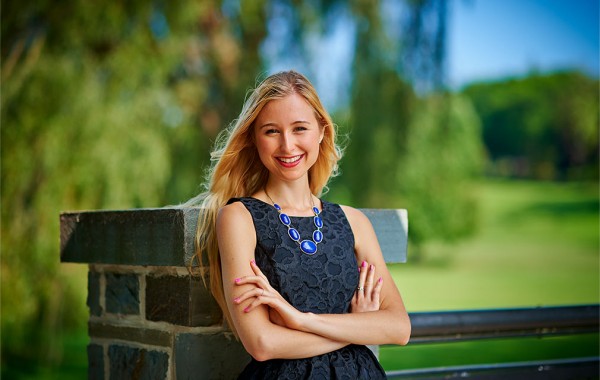By Kathryn Van Scoter ’16
As a religious studies major, I am frequently asked an innocent yet cumbersome question: Are you religious?
People are expecting a definitive answer: “Why, yes. I am an Episcopalian,” or “Kind of, but I only go to church on Christmas,” or even “No, I don’t believe in God.” But my ability to give a straightforward answer is equal to my ability to inhale a 600-calorie slice of cheesecake.
Nonexistent.
I usually just offer the dry salad of responses — “Why else would I study religion?” — followed by a chuckle of vinegar for some added flavor.
Religion is my sword. Humor is my shield. Food is my medicine. Together, they have conspired to create and destroy ED. My God. My Enemy. My Eating Disorder.
• • •
To any outsiders looking in, I had a very comfortable childhood and a flawless family. My father was a driven CEO with killer hair and my mother was everything that an ideal 105-pound housewife should be. My little brother’s greatest childhood struggle was putting on weight, which was the opposite of my own challenge: keeping it off. My ultimate goal was to be the feminine ideal of both my mother and the skeletal models traipsing across the pages of Vogue magazine.
While media influences affirmed my parents’ living example of the idea that only thin, beautiful people matter, my Episcopalian congregation implied an even-more ominous message: only thin, beautiful people are acceptable in the eyes of their God.
I was raised with the understanding that I must better the world in order to enter the pearly gates of heaven. And if the world could not accept me for the overweight child I was, there was no hope that I could change the world. Therefore, how could I be good in the eyes of this God?
This sentiment was reinforced each and every time I attended Holy Trinity Episcopal Church in my size-16 sundress from Talbot’s Kids. Standing next to my perfect family, I could feel the disapproving gazes and, worse, the pity held by the congregation as a whole. Feeling rejected by my church and its many 105-pound housewives, I grew to resent both the institution and my faith as a whole. I grew to resent God.
Naked before a judgmental spiritual power, I hoarded my secrets in the ticking time bomb that was my body.
When I was 12, the bomb went off in the form of self-destruction.
• • •
It’s been nine years since I met ED (Eating Disorder). Our love affair began ever so slowly, until I fell face-first into his arms and the unknown.
On a two-week exchange program to Mexico, ED took me by surprise. We had our first dance whilst twirling blissfully around a plate of untouched spaghetti and, soon after, we shared our first kiss on a scale offset by 10 pounds. When I returned home, my family was wary of my engagement, so I kept my suitor’s identity secret.
ED and I shared simple pleasures. There was nothing that made us happier than watching my father and brother devour pizza while we shared dry salad with Mom. Like any good lover, ED rewarded my good behavior with the intoxicating flowers of femininity.
As I dropped far below my mother’s “idealistic” weight range, ED decided to make me his bride. Although I had always seen myself getting married in a church, we did it ED’s way and got married in a hospital bed instead. ED reassured me that we did not need the priest’s sanction, for he could be my god, one who could provide me with all the components of a traditional religion — fasting, asceticism, sacrifice. Isolated from my family and friends, I had no choice but to comply.
Over the years, ED and I experienced many breakups and reunions. My conflicted yearning for both control over my life and the relief that came from surrendering to a higher power kept me tethered to ED. He was the closest thing that I had to a god.
But I grew weary of trading my body for peace of mind, and I attempted to divorce ED in the very same hospital bed in which we were ensnared. At first, he waved the white flag. However, the second I left Children’s Medical Center, I could feel his firm grasp holding me tighter than ever before.
In the coming months, ED would strip me down to a meager 68 pounds.
• • •
I was not able to break free from ED’s iron trap until my graduation from a spiritually oriented residential treatment facility. Here, I was given the freedom to differentiate and separate myself from ED. At the same time, I was also challenged to redefine both myself and the God that I once knew.
While ED and I still talk occasionally, he no longer sustains me. He has been replaced by a good and merciful presence that is much more complex and difficult to define. It is this very presence that cradles my body, mind, and spirit without suffocation and, on my worst days, encourages me to dress my salads. On my best days, I can even take a bite of cheesecake without fear or anxiety.
To me, this presence is the very essence of God. Indeed, my ability to find comfort in the unknown is a testament to the power of God.
Does this make me religious? Maybe. Maybe not. Honestly, I still don’t know. Why else would I study religion?
Kathryn Van Scoter ’16 has interned at Harvard Law School and for OnFaith, a website devoted to covering religion and spirituality, for which she originally wrote this essay. A religion major from Pasadena, Calif., she hopes to attend law school after graduation.








Loved the story. We all fight different fights, may your strength guide you.
Kathryn, great job on this well written, brave, and insightful essay. Thank you for sharing your story. I am so proud of you!